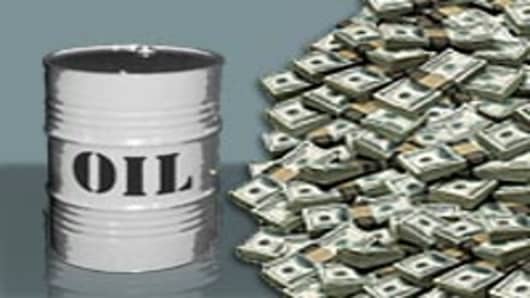With oil prices topping $112/barrel and some analysts predicting the next stop to be $120, will OPEC finally step in and add crude to the market to tame prices?
I doubt it will happen. OPEC members have reiterated over the past few days that they think they believe the oil market is adequately supplied and they have no intention of increasing production to keep oil prices from spiking higher. (OPEC's next scheduled meeting is in Vienna in September.)
The cartel is already pumping more oil than they'd promised, according to a Platts survey released earlier today.
OPEC pumped 32.22 million barrels of crude per day in March, a 110,000 bpd decrease from February, but that was mostly due to maintenance work in Nigeria and Venezuela, Platts found. Excluding Iraq, the 12 members of OPEC pumped 177,000 bpd over their 29.673 million bpd quota.
OPEC's President Chakib Khelil said Tuesday it's not a supply shortage driving up prices, though he admitted high prices are here to stay. Why? John Kingston, Platts global director of oil, said the fact that OPEC-12 pumped well over its production target shows "members are more than happy to take advantage of record high prices." Khelil and other oil ministers say it's not their fault prices are sky high. They've have pointed to the weakness in the dollar and blamed speculators in the marketplace for driving up prices.
But "speculators" may be too broad a term. We found commentary from oil economist Philip Verlager on the so-called "commodities bubble" in Tuesday's Gartman Letter very enlightening on that point.
Verlager said speculation on the long side accounts for less than 10 percent of market share when adjusted for index funds. He says speculators have played a "modest role" in the price rise and that spike we've seen is not a "bubble" but due instead to "the inability of policymakers to address important structural imbalances in the economy."
There's a great deal of debate on the role of speculators. MF Global energy analyst and CNBC contributor John Kilduff points to the Citi report released this week showing investments in commodities rose by $40 billion in the first quarter to $400 billion--a clear sign, he says, that speculation is driving this train.
But whether they're making short-term best or longer term investments, the fact is investors are pouring barrels of money into oil and commodities.
The big question now is how much longer these flows will continue, that will likely determine, how much higher prices will go.
Questions? Comments? energysource@cnbc.com



